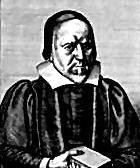Faithful Shepherd 6B
Another example Matt 10:4
These be the words of our Saviour Christ in his commission given to his disciples. He commanded them to preach and to go hither and thither, and yet without concern for corporal provision. Intimating also to them that all should not receive them, he, foreknowing man’s thoughts, who upon hearing of enemies would be somewhat discouraged, he here prevents an objection or answers closely that question which they might make concerning their behaviour to the obstinate and what shall befall them. All of which is to encourage the disciples and their ministry. The parts whereof are two in general, a combination and a commandment.
These be the words of our Saviour Christ in his commission given to his disciples. He commanded them to preach and to go hither and thither, and yet without concern for corporal provision. Intimating also to them that all should not receive them, he, foreknowing man’s thoughts, who upon hearing of enemies would be somewhat discouraged, he here prevents an objection or answers closely that question which they might make concerning their behaviour to the obstinate and what shall befall them. All of which is to encourage the disciples and their ministry. The parts whereof are two in general, a combination and a commandment.
1. In the threat
1. The parties threatened. Whosoever, the persons, and after the place, the house or city.
2. Why, for two offences, not receiving the disciples and for not hearing their words.
3. The certainty of the threatening confirmed to his disciples, truly I say to you.
4. What is threatened, to wit, their certain damnation and impossibility to be saved, delivered in a comparative speech, it shall be easier.
5. The time when this shall be effected, in the day of judgement.
2. In the commandment.
Observe
1. The time, when they depart.
2. Who, the disciples, all of them.
3. What to do, shake off the dust of their feet.
Thus may we do with any Scripture, if we can but know the general, how to name it and lay it open by circumstances, even as the words lie in order. This manner of dividing will afford much matter, easy for the method and descend to the capacity of the simplest hearer. But here is no small cunning required to gather out lessons from every circumstance fitly, yet easy to anyone that understands and hath laboured herein, as shall be after demonstrated by example.
If it be held too great a curiosity so distinctly to note every word, as it were, and circumstance, then the general division only may be observed and one or more of the words followed, passing from one to another briefly at his pleasure. The way is all one – this more easy and less distinct to the understanding in particulars, the other more hard and subject to the censure of a mean hearer, any whit exercised in the word, who more easily judgeth and seeth the collections of doctrines and how it is followed and when the preacher keeps or roves from the present matter.
1. The time, when they depart.
2. Who, the disciples, all of them.
3. What to do, shake off the dust of their feet.
Thus may we do with any Scripture, if we can but know the general, how to name it and lay it open by circumstances, even as the words lie in order. This manner of dividing will afford much matter, easy for the method and descend to the capacity of the simplest hearer. But here is no small cunning required to gather out lessons from every circumstance fitly, yet easy to anyone that understands and hath laboured herein, as shall be after demonstrated by example.
If it be held too great a curiosity so distinctly to note every word, as it were, and circumstance, then the general division only may be observed and one or more of the words followed, passing from one to another briefly at his pleasure. The way is all one – this more easy and less distinct to the understanding in particulars, the other more hard and subject to the censure of a mean hearer, any whit exercised in the word, who more easily judgeth and seeth the collections of doctrines and how it is followed and when the preacher keeps or roves from the present matter.
How to divide in another manner, in show more learned
If this way be not liked, instead of this dividing and for general heads one, two or three propositions may be gathered and as parts followed every proposition containing the substance of the circumstances in the general part.
If this way be not liked, instead of this dividing and for general heads one, two or three propositions may be gathered and as parts followed every proposition containing the substance of the circumstances in the general part.
As for example, to declare my meaning, Acts 10:33
The words are part of Cornelius’ answer and contain in them three parts.
The words are part of Cornelius’ answer and contain in them three parts.
1. Cornelius’ obedience in these words, therefore sent I for thee immediately. Wherein we note these circumstances
1. The cause, in therefore
2. The things done, in sent
3. Who, in I, that is Cornelius
4. For whom
5. When
1. The cause, in therefore
2. The things done, in sent
3. Who, in I, that is Cornelius
4. For whom
5. When
2. Cornelius encouraging and commending of Peter. Wherein note
1. Who and whom
2. For what
1. Who and whom
2. For what
3. Cornelius’ readiness, in the last words, where observe
1. When 2. The cause 3. The parties 4. The place 5. The manner 6. The end 7. What
These three propositions contain plainly these several circumstances knit up together as doctrines.
These three parts thus set forth by circumstances may be drawn into three propositions and instead of this dividing the teacher may say ‘We will in these words (after he hath read the verse) handle and speak of three things’
1. That the commandment of God must make him to whom it is given to obey the same without delay.
2. That those which send for God’s messengers should openly encourage them by commending their willingness in coming.
3. That hearers knowing of their coming should make themselves ready, wait for them, submitting themselves with reverence to hear whatsoever they shall teach them from the Lord.
These propositions may be proved and followed in the same order to a man’s self, as the circumstances should be but yet in a different presentation to the auditory – the other being delivered plainly and in a disjointed speaking, handling every circumstance by itself. But this way largely set forth with a continued speech, to the end of every proposition. The other easy to be conceived by the hearer and be delivered of the speaker, requiring neither singular memory nor much liberty of speech. And therefore to tickling ears a harsher way, though for all sorts more profitable. This other way not so easy nor so evident, hardlier to be understood by the simpler sort and more difficult to be performed by the Preacher, except he have a good memory to help well his understanding and also a ready tongue, freely unfolding without stop the conceits of the mind. Choose either according to your gifts but do all to edification.
1. When 2. The cause 3. The parties 4. The place 5. The manner 6. The end 7. What
These three propositions contain plainly these several circumstances knit up together as doctrines.
These three parts thus set forth by circumstances may be drawn into three propositions and instead of this dividing the teacher may say ‘We will in these words (after he hath read the verse) handle and speak of three things’
1. That the commandment of God must make him to whom it is given to obey the same without delay.
2. That those which send for God’s messengers should openly encourage them by commending their willingness in coming.
3. That hearers knowing of their coming should make themselves ready, wait for them, submitting themselves with reverence to hear whatsoever they shall teach them from the Lord.
These propositions may be proved and followed in the same order to a man’s self, as the circumstances should be but yet in a different presentation to the auditory – the other being delivered plainly and in a disjointed speaking, handling every circumstance by itself. But this way largely set forth with a continued speech, to the end of every proposition. The other easy to be conceived by the hearer and be delivered of the speaker, requiring neither singular memory nor much liberty of speech. And therefore to tickling ears a harsher way, though for all sorts more profitable. This other way not so easy nor so evident, hardlier to be understood by the simpler sort and more difficult to be performed by the Preacher, except he have a good memory to help well his understanding and also a ready tongue, freely unfolding without stop the conceits of the mind. Choose either according to your gifts but do all to edification.
What use is made of logic, an art most necessary for a minister
Here is required in the teacher skill in the art of logic, a special handmaid by the assistance of God's Spirit, to serve for great use in reading the Scriptures, in interpreting and laying them open unto others. By logic we see the method of the Spirit, we behold the arguments, the coherence and the scope. By it we collect doctrines, confirm and enlarge the proofs, gather thence consequently apt uses and urge them by reasons upon the hearers. Without this a teacher can never soundly lay open the Scriptures, solidly prosecute any any matter nor pithily persuade nor firmly establish a truth nor judge of consequents nor convince and adversary well nor answer warily man's subtleties nor wittily prevent cavilling sophistry. A man's oration without logic is but found of words without reason, an ignorant discourse in which if the tongue be slight and memory weak, as the hearer shall oft lose the drift of his words, so he shall not seldom forget himself by over running both his won and other men's wits.
Let logic be then the stern to guide the course of thy speeches, that the sudden blasts of affections overwhelm thee not, if thou intend to speak judicially.
Here is required in the teacher skill in the art of logic, a special handmaid by the assistance of God's Spirit, to serve for great use in reading the Scriptures, in interpreting and laying them open unto others. By logic we see the method of the Spirit, we behold the arguments, the coherence and the scope. By it we collect doctrines, confirm and enlarge the proofs, gather thence consequently apt uses and urge them by reasons upon the hearers. Without this a teacher can never soundly lay open the Scriptures, solidly prosecute any any matter nor pithily persuade nor firmly establish a truth nor judge of consequents nor convince and adversary well nor answer warily man's subtleties nor wittily prevent cavilling sophistry. A man's oration without logic is but found of words without reason, an ignorant discourse in which if the tongue be slight and memory weak, as the hearer shall oft lose the drift of his words, so he shall not seldom forget himself by over running both his won and other men's wits.
Let logic be then the stern to guide the course of thy speeches, that the sudden blasts of affections overwhelm thee not, if thou intend to speak judicially.












No comments:
Post a Comment